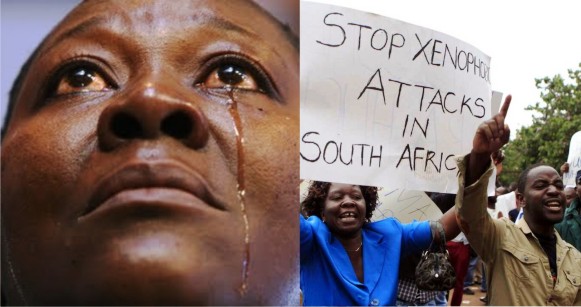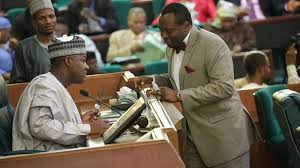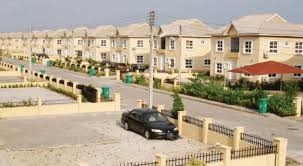Opinion
The Nigerians’ Agony

The xenophobic attacks in South Africa have become so frequent that they follow a known and triangular pattern: riots by the South Africans targeting shops and foreigners; violent clashes (in response to attacks); then arrests and dispersal of rioters by law enforcement agents. The fourth perhaps is: hypocritical speeches and admonitions by the South African authorities to the victims.
In 2008, similar attacks occurred which claimed about 60 lives. It happened again in April 2015 when at least six persons died. Now, for the past two weeks, we have been witnessing a recurrence of the xenophobic attacks. South Africans are at it again. They have never hidden their deep hatred towards foreigners for ‘hijacking’ or outrightly ‘stealing’ jobs and businesses meant for them.
Like others, the attacks this time are still directed at all foreigners. However, it seems that Nigerians are the real targets. For instance, on February 24th, protesters, brandishing all manner of dangerous weapons, stormed the South Africa’s Foreign Ministry with a petition in hand. Among other things, the document specifically asked for the following: “They are arrogant and they don’t know how to talk to people, especially Nigerians”.
The statement is clear and doesn’t need interpretation. It corroborates the widespread claims that Nigerians and their businesses have been particularly targeted in the attacks. This, without doubt, has ignited apparent backlash back home.
In Abuja, the Nigeria Labour Congress, NLC, condemned the xenophobic attacks on Nigerians. A statement signed by Ayuba Wabba, the NLC President, said the February attacks, like those of 2008 and 2015, were unacceptable. He urged the South African Government to move without further delay to prevent a recurrence.
Similarly, the Senior Special Assistant to President Muhammadu Buhari on Foreign Affairs and Diaspora, Abike Dabiri-Erewa, described the attacks as an “unnecessary setback”. She condemned the random deportations of Nigerians and claimed that “they have been arbitrarily raided”.
Still in Abuja, tension rose to fever pitch when members of the National Association of Nigerian Students, NANS, burnt a South African flag and threatened reprisals against South African corporations in Nigeria. Indeed the students broke into the headquarters of the South African company, MTN, which is Nigeria’s biggest telecommunication firm.
Relations with South Africa dominated proceedings in the Senate as lawmakers decided that they wouldn’t move for the severance of diplomatic relations, but send a delegation to South Africa to demand concrete actions and an explanation.
“This attack has become one too many,”said Senate President Bukola Saraki. “We must put a stop to these attacks. We must take the bull by the horn. That is why we have resolved to meet with the South African parliament.”
While we lament or deplore the cruel treatment by our South African friends, we must ask ourselves some obvious questions, do some deep introspection and understand the reasons for their barbaric act. Unfortunately, the South African government and its citizens believe that foreigners are responsible for their ailing economy.
It is time the federal government realized that Nigerian emigration situation has reached a crescendo and must be addressed with all seriousness. In a 2016 report, the Italian Interior Ministry claimed over 36,000 illegal Nigerian emigrants made the voyage of death across the Mediterranean Sea to Italy in that year alone. Those who journey on this route understand the degree of risk in reaching their destinations. Some get drowned in the sea, while others are either summarily executed or detained in anti-immigrant camps.
Just recently, a gory picture emerged on the internet of some African men, including Nigerians, with hands raised behind their heads while being hurled to their death in the hands of gun-wielding Libyan militiamen. The only official response to the mass execution was a travel warning from Dabiri-Erewa. After that everyone returned to passiveness or deliberate amnesia.
We cannot hide the fact that Nigeria is perceived in the eyes of the international community as exporter of crimes, such as drug business, financial crimes and human trafficking etc. We cannot deny the fact that Nigerians constitute the highest number of prostitutes in Europe and elsewhere, while we remain the all-time signature reference on Advanced Fee Fraud, locally called ‘419’.
Apparently, the root causes of emigration of Nigerians are corruption, bad governance, poverty, injustice, unemployment, insecurity and economic hardship, among others. If the incidents of bestiality against Nigerians fail to provoke government to formulate policies that will properly address the factors underlying the exodus of Nigerians, the latest xenophobic attacks should.
Despite the risk involved, it is unlikely that Nigerians facing those conditions will not jump at an offer to travel to countries where they are unwanted. Until the Nigerian government puts on its thinking cap and fashions out policies that will address the socio/economic factors underlying illegal emigration, Nigerians should expect more attacks and inhuman treatment in foreign lands.
Arnold Alalibo
Opinion
Kids Without Play Opportunities

“All work and no play”, its said, “makes Jack a dull boy.” Despite this age-long maxim that recognises the role of play in early childhood development, play appears to be eluding many Nigerian kids. The deprivation of play opportunities comes in different forms for the Nigerian child depending on family’s social setting or status, but the effect is much the same. For children in Nigerian poor families, life is becoming as much a hassle as it is for their struggling parents. Due to harsh economic conditions, many families resort to engaging their kids prematurely in trading activities especially in hawking, to help boost family revenues, when these kids should be enjoying leisure after school. Some of these children barely attend schools while being forced to spend much of their childhood hustling in the streets. For children from well-off families, time could be as crunchy as it is for their busy parents when, obsessed with setting agenda for the future of their kids, parents arrange stringent educational regiment too early for their kids.
These group of children are made to get-off the bed by 5.30am every weekday, get ready for private school buses that call at 6.00am, otherwise report by however means to school at 7.20am.The situation is worse for kids in the city of Lagos where the need to beat urban traffic rush-hours is very high. Most children are further subjected to extra hours of lessons after school at 2.00pm, only to be released with loads of homework. On many occasions children who leave home for school at 6.30am get back by 3.30pm. With hardly enough time to eat, do school assignments and take afternoon naps, these children hardly had time for plays before dinners. In Nigeria, kids of ages between 3 and 12 spend averages of 9 hours a day and 45 hours a week to and from schools, and additional hours doing home assignments and domestic jobs, whereas their peers in developed countries spend about half that duration and have more time for leisure.
Any remaining spare time left after school work or street hustle is further stolen, when kids who usually are fascinated by gadgets, are exposed to household electronics like phones, tablets and gaming consoles. Electronic games may create a sense of leisure, but the difference with human interactions is that kids doing games interface mostly with machines or with programme structured in ways that entrap a child’s pysch directionally, according to the game’s programming, in ways that may not encourage independent thinking. Moreso, attraction to such gadgets displaces kids’ attention from important television and radio programmes. The prevalent tight, academic schedules for some Nigerian kids, though intended for academic excellence, encroaches on childhood leisure time needed to achieve an all-round childhood development, and could make children to resent formal education altogether. Besides, academic excellence or economic pursuit, is not all there is to living a well-nurtured life.
Children’s leisure time, defined as time left over after sleeping, eating, personal hygiene and attending school or day-care, is very crucial to childhood development. Sociologists recommend that children should have at least 40 per ceny of the day as leisure. According to Berry Brazelton, a former pediatrician at Harvard Medical School, “Play is the most powerful way a child explores the world and learns about him or herself.” Unstructured play encourages independent thinking and allows the young to negotiate their relationships with their peers, and in the process build self-confidence and self-control. Play is one of the important ways in which young children gain essential knowledge and skills. Leisure time enhances learning as fun enables children to learn at their own level and pace. Young children naturally explore and learn many skills by making cognitive connections from events that catch their attention.
Unstructured plays help children developed their cognitive, physical and communication skills that make them acquire social qualities necessary in navigating relationships in adult life. Plays enable children assess how others feel and learn perspectives as well as empathy through observing differences in facial expressions, body language and even tone of voice, which helps them copy how to express themselves to others, and therefore develop socially acceptable behavours that build relationships. In cooperative activities, children willingly take things in turn and may delegate roles. Children can also share the glory of winnings through competitive games, which is all great for working together in task sharing. Aside encouraging parents to ensure adequate leisure time for their kids at home, schools should make plays and exercises an integral part of the educational curriculum. The educational curriculum set by the Nigerian Educational Research and Development Council (NERDC) includes specific training durations and break periods, as well as sporting activities, as part of the school system.
Due to poor government funding, sports in public schools have declined, while most private schools lack sporting infrastructure or even play grounds. These make recreational activities and sports implementation almost impossible in schools. Also, the increasing rate of urbanisation in Nigerian communities is gradually eroding ancient playgrounds, while established urban centres have lost community playgrounds. With tightening apartment spaces now being the norm in most urban residential areas, many kids are forced to wriggle within burglary-proof enclosures. Nigerian governments and the relevant agencies should ensure that existing child labour protection laws, educational and urban development codes are implemented in the country, to enable proper nurturing of children as the future stakeholders of our society. Private schools, especially, should be supervised to ensure they follow the educational curriculum standards set by NERDC.
In a bid to impress parents and draw more patronage as better option than public schools, private schools, most of whom operate in cramped environments, have continued to set high regiments of training schedules beyond the capacity of most kids, and even encourage enrollment of pre-school age kids who can not sit still to listen for an extended periods of time. Schools, from creche to secondary levels, without playgrounds and recreational facilities should not be allowed to operate, and should be made to understand and implement appropriate curriculum and training durations. Many Nigerian kids, whether from rich or poor families, appear to have been set-up inadvertently, in the same leisure denial that affects their parents. All work and no play could lead to some messed-up kids who grow up not understanding social cues, and being unemotional and self-centered, manifest later as obsessive-compulsive adults.
By: Joseph Nwankwo
Opinion
Congratulations Fubara, Joseph Of Rivers State

We thank God who is above all human contrivance and arrogance. Congratulations, Your Excellency Amaopusenibo Sir Siminalayi Joseph Fubara. Your victory takes us back to the Bible as a living document of a God that rules in the affairs of all His creation. In a manner of speaking, welcome back from your first war with Phillistines, Your Excellency! Yes, first example is David and Goliath! And like David, Your Excellency stands over Goliath in victory. But that is not enough. Our real enemy is that Your Excellency is Governor of a State with a wretched economy. Indigenes of Your State are today reduced to battalions of beggars waiting for who will hire their loyalty on the usual “pay-as-you-go” basis.
Your Excellency, it brings us to another Bible- based parallel. Conscientious Rivers indigenes above 50, should identify with and commit our all to this second parallel. It is to liberate the economy and people of Rivers people from 23 years enslavement and poverty, for us to regain our dignity and pride. When the economy of Egypt was drifting into a disaster zone, even Pharaoh did not know it. He also did not know what to do. But God sent a Joseph to build the economy into a fortress of good fortune that overcame the economic and social disaster Egypt did not know was ahead. Your Excellency for 23 years, Rivers State has been ruled without any logical, credible and consistent PLAN of how to overcome mass poverty from our dehydrated local economies.
Your Excellency, Rivers State cannot survive one month without Federal allocation! So called IGR only about 10 per cent of Federal allocation.It is also not based on what we produce but on tax from other people’s productivity that pass through our State. Pharaoh did not know what to do in the case of Egypt. May it please God to position another Joseph in Governor Siminalayi Joseph Fubara to heal Rivers State and build an economy that all Africa will come to access in order to chart a new course out of worsening economic hardship that is caused by near zero investment in productivity and endemic reckless looting. They are the twin chambers nursing a corporate cancer unfolding across Nigeria and Africa. The hard work begins today, Your Excellency.
We need an economic blueprint that will enrich every Rivers senatorial district from investment to grow productivity and to enrich every Rivers person from career-based productive labour, just as Pharaoh was enriched by Joseph’s economic Blueprint. Let Rivers State stop the trend of waiting the lives of young Rivers people recruited by Phillistines into cultism, thuggery and easy money, as a career. These Phillistines believe they have only lost one phase of many legal battles and battles by other means. But from comments in the public media, their eyes are fixed on 4-years of war and more! Your Excellency, we the people will not let you forget what you owe us. We have to make unbelievers see that your leadership is different and that we are uprooting the old order of an unproductive Feudal System. That system makes a few persons and their cronies to monopolise our collective wealth, while the majority are left in misery. Let’s put an end to enslavement by cabals and mass poverty in Rivers State. That is when the Phillistines will surrender.
By: Amaopusenibo Brown
Opinion
Reserved Seats for Women: A Step Forward
-

 Politics5 days ago
Politics5 days ago2027: Nigerians Victims Of Desperate Politicians – Cleric
-

 Business5 days ago
Business5 days agoCBN Comptroller Warns Against Naira Sale
-

 Politics5 days ago
Politics5 days agoObasanjo, Tinubu Mourn Audu Ogbeh’s Death @78
-

 Maritime5 days ago
Maritime5 days agoMWUN, Police Parner In Safer Port Operations
-

 Politics5 days ago
Politics5 days ago2027: APC Woos Enugu Gov
-

 Business5 days ago
Business5 days agoReal Estate GDP Contribution Surges To N41.3tn
-

 Business5 days ago
Business5 days agoFreight Forwarders Raise Alarm Over Govt Reforms Sabotage
-

 Niger Delta4 days ago
Niger Delta4 days agoC’River Communities Seeks Govt Intervention In Humanitarian Crisis

